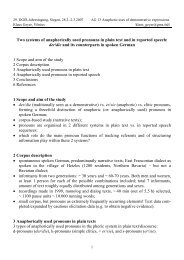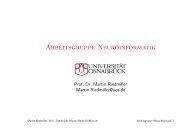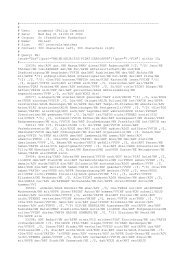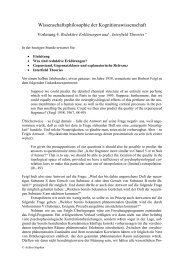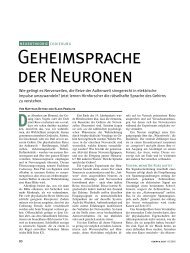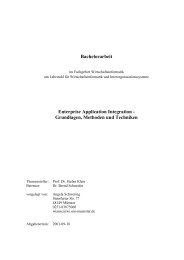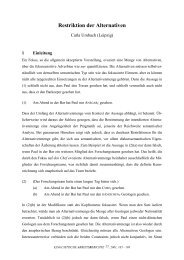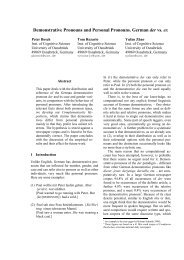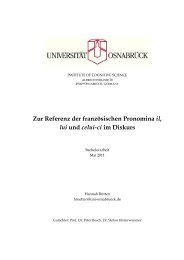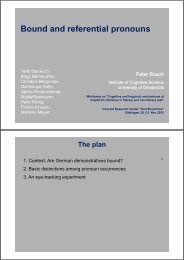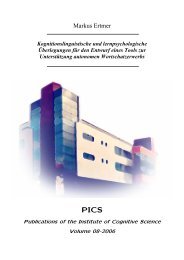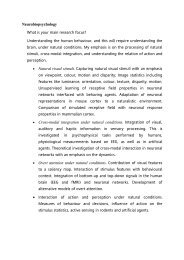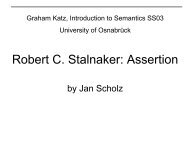Proceedings of the 6th Annual Meeting of the - Heinrich-Heine ...
Proceedings of the 6th Annual Meeting of the - Heinrich-Heine ...
Proceedings of the 6th Annual Meeting of the - Heinrich-Heine ...
You also want an ePaper? Increase the reach of your titles
YUMPU automatically turns print PDFs into web optimized ePapers that Google loves.
If B were to follow up <strong>the</strong> general claim in this context with a statement using an anaphoric<br />
pronoun, <strong>the</strong>n we would expect <strong>the</strong>re to be a uniqueness implication (that he had witnessed just<br />
one such accident) since <strong>the</strong>re is no implicature introducing a speaker’s referent and so no option<br />
for <strong>the</strong> audience to understand <strong>the</strong> pronoun as referring to some particular accident <strong>the</strong> speaker<br />
has in mind. Considering (21), we find that this is <strong>the</strong> understanding we get:<br />
(21) B: I’ve spent half <strong>of</strong> my working life driving on motorways, so, in fact, I have<br />
witnessed a high-speed motorway accident. It was fatal. But I still think that one<br />
should be allowed to drive as fast as one wants.<br />
It is worth noting that one would assume that if someone spends a lot <strong>of</strong> time on motorways, <strong>the</strong>n<br />
<strong>the</strong>y would most likely have witnessed a good number <strong>of</strong> <strong>the</strong>se accidents. This suggests that one<br />
is not free to interpret such discourses as if <strong>the</strong> to interpretive options were a matter <strong>of</strong> some kind<br />
<strong>of</strong> linguistic ambiguity (as van Rooy 2001 seems to suggest). It is <strong>the</strong> rhetorical properties <strong>of</strong> <strong>the</strong><br />
preceding discourse which determine whe<strong>the</strong>r a speaker’s referent is available. Fur<strong>the</strong>r examples<br />
<strong>of</strong> this are already available in <strong>the</strong> literature. (22) is adapted from Geurts (1997). Here <strong>the</strong> first<br />
part <strong>of</strong> <strong>the</strong> discourse contradicts some stance <strong>of</strong> <strong>the</strong> audience. What kind <strong>of</strong> grounds <strong>the</strong> speaker<br />
has for this act is not all that relevant to this purpose and so it is unlikely that <strong>the</strong>re is any<br />
implicature involving grounds. So, when a pronoun is used in <strong>the</strong> next assertion, we once again<br />
are bound to use only <strong>the</strong> general quantificational information as a resource for constructing an<br />
interpretation for <strong>the</strong> pronoun - resulting in a surprising uniqueness implication:<br />
(22) It is ludicrous to pretend that <strong>the</strong>re has never been an accident on this motorway. We both<br />
witnessed it, remember?<br />
When predictions involving indefinites are made, we <strong>of</strong>ten understand <strong>the</strong> speaker to have no<br />
specific grounds. Stalnaker (1998) uses <strong>the</strong> prediction in (1)b (repeated below in (23)a) to make<br />
this basic point. To get <strong>the</strong> force <strong>of</strong> <strong>the</strong> example, we are supposed to be assuming that <strong>the</strong> speaker<br />
has no particular woman in mind in making <strong>the</strong> prediction. Intuitions may be sharper with <strong>the</strong><br />
variant in (23)b:<br />
(23) a. I predict that a woman will be nominated for President in 2004. I also predict she<br />
will win.<br />
b. I predict a woman will finish in <strong>the</strong> top twenty in this year’s marathon. But I<br />
predict she won’t win it.<br />
The second observation we can make about <strong>the</strong> pragmatic approach is that it makes <strong>the</strong> correct<br />
predictions with regard to what is explicit and what is implicit in discourses such as in (1)a. For<br />
<strong>the</strong>se discourses, <strong>the</strong> prominent understanding is one which would be glossed, ‘An F which Gs<br />
Hs’. According to <strong>the</strong> pragmatic E-type approach, <strong>the</strong> first sentence uttered expresses <strong>the</strong> general<br />
proposition involving <strong>the</strong> co-instantiation <strong>of</strong> F-ness and G-ness. While <strong>the</strong> claim about <strong>the</strong> second<br />
sentence is that it makes reference to <strong>the</strong> individual <strong>the</strong> speaker has in mind and says <strong>of</strong> it that it<br />
Hs. If that is <strong>the</strong> case, <strong>the</strong>n <strong>the</strong> prominent understanding would have to be in some sense implicit.<br />
Can that be correct? To demonstrate that it is, consider <strong>the</strong> scenario in (24)a - adapted from<br />
Stalnaker (1998). Suppose also that, in reporting on <strong>the</strong> events, John utters (24)b:<br />
24



